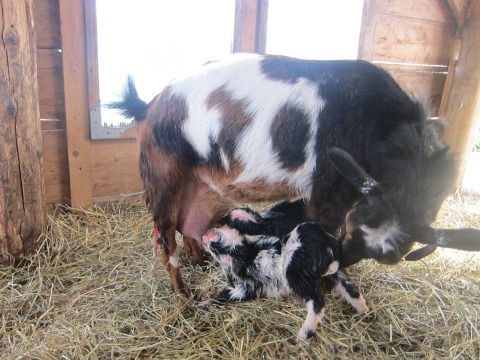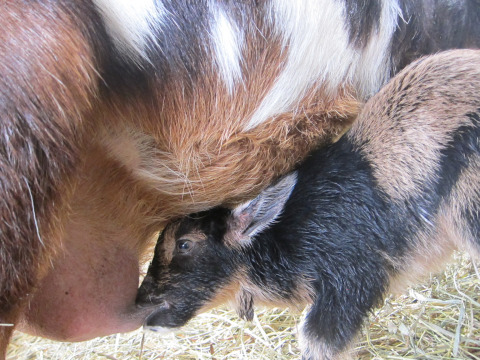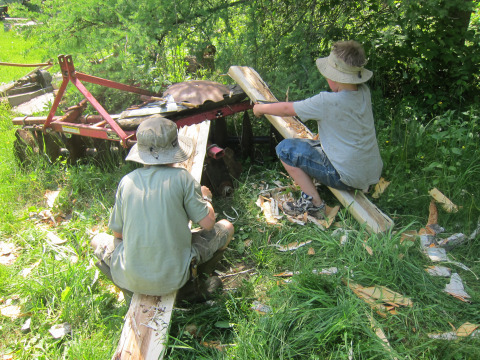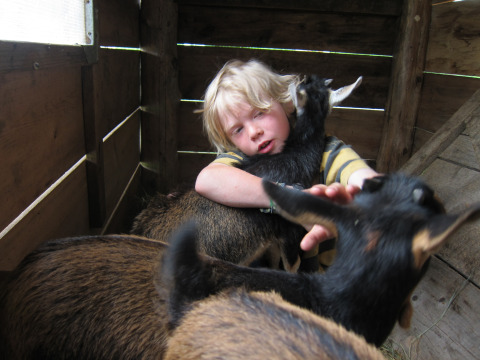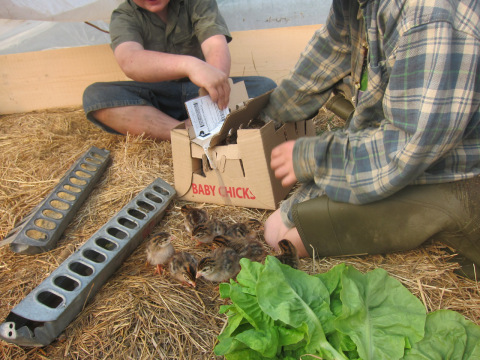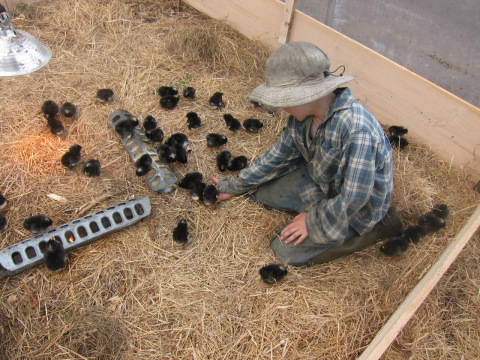Ben Hewitt's Blog, page 67
June 11, 2013
Free, Not Easy
$AVED is officially out today, and because I’m in a generous, gregarious mood, I am prepared to offer a free copy to one of you. I should probably award it randomly, but that seems much too fair and not nearly enough fun. Instead, I will send it to the person that, between now and Friday, can most entertain me with the tale of what they would otherwise spend the $25 cover price on. Think of it as an opportunity to be creative, but of course honesty counts, too. Please direct all replies to the comments. Thanks!
Also, I’ll be at the Galaxy Bookshop in Hardwick tonight. No promises, but I might be accompanied by a surprise guest.

June 10, 2013
The Personal Economy
Over the past few days, as I’ve embarked upon the modest roadshow surrounding the release of $AVED, I have had many conversations about money and wealth and time and freedom. Over the next few weeks, I hope to have many more. The other day, I wrote that it is sometimes difficult to come back into the intellectual and emotional space of a book I finished writing nearly a year ago, but this time, it has been easy. I suspect this is because I live these issues every day. We all do.
I remember when I was going over the final pass pages (this is publishing speak for the last-chance-to-catch-a-typo-or-change-your-mind-about-something) and I was having one of those moments every writer has (or maybe not every writer, but this writer, at least) when they think what a load of bullocks. This is crap. Penny, in her inexhaustible wisdom, said something like “Maybe not everybody’s going to like this book, but it will have an impact on somebody’s life, and that will feel like enough.” Already, I have heard from a handful of people who have read the few copies that have made the rounds, and Penny has been proven correct. She usually is.
I am thinking a lot about what comes next. True, I have another book in the pipeline, and that is swell, but the advance was modest and I cannot afford to spend too much time congratulating myself. My agent is shopping another proposal, but of course the process is taking far longer than I ever could have imagined, and there is no way to predict if the book will sell or not. Or if it does, for how much. Any day, I could get an offer that will mean I don’t have to worry about income for the next year or more. Alternately, it could be another two months before I finally realize that the proposal isn’t going to sell, and I’m back to square one.
Amidst it all, along comes Katz again, with yet another half-inspirational, half-soul crushing post on the future of writing as a profession. I am inspired because I see how he is managing to forge ahead in a new paradigm. And I am a bit crushed, because I see that a NY Times Best Selling author (a short aside: Last night, I was chatting with Melvin in his barnyard, and he was heckling me because the Hardwick Gazette apparently referred to me as a “renowned author.” To which I of course replied “renowned for what?”) who gets 120 5-star Amazon reviews and 160k website visits a month is compelled to rethink his business model.
What does all this mean for me? Who the heck knows? Katz is beginning to sell subscriptions to his blog, and I commend him for that. And in all honesty, I’d probably do the same if I had six figures worth of monthly readership. You’d have to be a fool not to see that writing is following in the footsteps of music, and that smaller acts such as myself are going to have to be both clever and nimble to make a go of it. You’d have to be fool to think you can continue gifting your work in a world in which almost everything you need comes with a price tag.
And yet, again and again I am drawn to the themes of all the conversations I’ve had over the past few days. One of those themes is the idea of a “personal economy,” which is to say, an economy of life that is about so much more than money. I guess what I’m saying (and as I’ve said before) is that I’ve come to view writing as merely one component in my personal economy. It is an important one, to be sure, but it is no more important than so many of the aspects of my personal economy that have nothing to do with money. Relationships, to other people, to animals, to nature. Our little farm and all the ways in which it fills our bodies, minds, and spirits. Time, and the extent to which it is ours to do with as we wish. Or to sell to others.
Still and all, writing is how I earn the bulk of the money to support my family, and therefore I must apply the mentality of money to my craft. I think I’m going to have to get better at this: I’ve never been fond of self-promotion, or of overtly asking people to support my work. But no matter how much I might like to think that gifting my work is somehow noble and will somehow shower me with cosmic good karma (both of which may actually be true), I am still beholden earning an income. Truthfully, if I continue to receive the sort of advances that I did for my current project, I will be unable to afford to continue writing books. In the grand scheme, that may or may not be a bad thing, although I have to admit I’ve gotten sort of attached to it.
Despite being a “renowned author,” I have no pithy rejoinder upon which to conclude this post. So I’ll let it go at that, and hope to meet some of you over the next few weeks.

June 7, 2013
Next Week
For those with interest:
Monday, I’ll be on NHPR’s The Exchange. 9 – 10. In the morning. 9 – 10 at night, I’m drooling into my pillow.
Tuesday, I’ll be on the Mark Johnson Show (WDEV) from 10-ish to 11. In the morning, again.
Tuesday, I’ll be at the Galaxy Bookshop in Hardwick from 7 until my eyelids start drooping. In the evening, this time.
Wednesday, I’ll be at MainStreet BookEnds in Warner, NH from 7 until I start getting drowsy. Evening.
Also, there is apparently an interview with me in the new issue of Outside magazine. I ain’t seen it, but my mom says it’s brilliant.

June 6, 2013
The Exchange
About a year-and-a-half ago, Fin and Rye bought a pair of Nigerian dwarf goats named Midnight and Flora. Penny and I loaned them the money to make the initial purchase, with the understanding that we would be repaid in milk and from the sale of offspring. There were some initial stumbles – stillborn kids, challenges breeding back, arguments over whose turn it was to fill the feeder, and so on – but the boys have stuck with the program, and despite my initial reticence (let’s be honest: nothing says “hippie” more than a couple of milking goats. Not that there’s anything wrong with that), I gotta admit, I like the little buggers. I’m talking about the goats, not the boys, although I suppose the sentiment and terminology could apply to either.
But mostly what I like is the combination of animals, children, responsibility, and experience. I like watching Fin and Rye with our animals; I like watching them connect with the critters on our farm, and I like that they understand in no uncertain terms how essential these animals are to a living, breathing farm ecosystem. They know about birth and death and meat and slaughter, of course, but they also know about shit and nutrients and planned grazing. They know how to size a day paddock for a given number of animals, and they know that what happens beneath the surface of the soil is more important than what happens above it. They know that keeping animals in the manner we do – which is to say, for milk as well as meat – demands a level of commitment to time and place that atypical of the contemporary norm. They understand that we are exchanging something – the freedom to come and go as we please – for something else, which might be described as the freedom that comes of not being able to come and go as we please. I realize that might not make sense to anyone but me.
As I’ve mentioned before, I sometimes think about the things my boys aren’t learning by spending their days in a classroom, or the ways in which they probably lag behind their schooling peers in the sort of memorized information that is so much a part of that curriculum. Not all of this stuff is superfluous, and they will need to learn it. I get that.
But I also get that there is so much they are learning for having been granted this freedom. On Monday, watching them tend to Rye’s doe, Flora, while she gave birth to twins, I was struck by the simple fact that under different circumstances, they could have been in school at that very hour. And I knew with absolute certainty that there was no better place for them to be than crouched in the hay in our barn, watching new life come into the world.

June 5, 2013
The Process
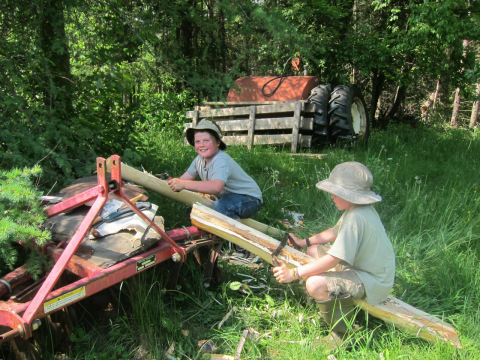
Another photo of the boys working on their shave horses. I like this because Fin looks so damn happy.
My new book comes out on Tuesday, June 11. Which is next Tuesday. Which is sort of soon.
This is my third book, and I am maybe 3/4′s of the way through my fourth, so I’m getting pretty familiar with the process. The strangest thing, I find, is that by the time a book is actually released, it’s been almost a year since I’ve finished writing it, although I suspect that lag time will shrink as digital publishing tightens its grip. This delay between writing and actual publication invariably means that by the time a book comes out, I’m immersed in my next project. I am a working class writer; I can’t really afford for it to be any other way.
To be honest, it’s a little difficult for me to come back into the mental and emotional space of a book I finished writing 12 months ago. For the next few weeks, I’ll be doing a bunch of readings (schedule updated here, if’n you’re interested) and interviews and whatnot, and this is all fine and dandy, but I also find myself struggling a bit to pull back from my current project and fully inhabit the book I’m expected to talk about. At the same time, I am starting to recognize that this may not be as necessary as I once assumed: Each of my books is in some way an outgrowth of what came before it, and it is becoming ever clearer to me how seemingly disparate subjects (food, money, education) are in fact joined at the hip. In a sense, you can’t rightly talk about our arrangements around food without talking about our assumptions around money, and you can’t rightly talk about our assumptions around money without taking about our expectations for our children’s education.
I have also learned to have absolutely zero expectations for how my work will be received and perceived, and how it will sell. My first book has sold fairly well; my second, not so much. Will SAVED sell? I have no idea, and I’m almost tempted to say I don’t care, but of course that would be lie. I do want it to sell, although I can honestly say I’m not certain I’d want any of my books to sell much more than what is necessary to enable me to earn a livable wage from writing. In this regard, to this point of my writing career at least, I can claim a perverse sort of success.
I do not generally read reviews of my work. Positive reviews are best avoided for their potential to make me believe I’m smarter/better/more correct than I actually am, and negative reviews are best avoided for their potential to make me believe I’m dumber/worser/less correct than I actually am. No review and nothing anyone can say about my work – be it positive, negative, or neutral – has any bearing on who I know myself to be and who I really am. This is not to say I’m not prone to forgetting that, which is precisely why I avoid reviews in the first place.
What I am looking forward to most is not the publication of my work, but the chance to connect with people in person and simply talk. I find that my written work is becoming increasingly nuanced and personal, and as it becomes more of these things, I want a level of connection that is difficult to achieve through writing alone. The other thing is, I just like people.
I am not very good at doing the hard sell, but I am not so selfless as to not try. If you appreciate what I share in this space (and if you don’t, you might ask yourself why you’ve read this far) and you are inclined to support me in a material way, please consider buying one or more of my books, which should be available at your local bookseller (if not, they can certainly order them). If you like them, please consider telling others. And if I am coming to a town near you for a reading or other event, please come out and introduce yourself.
Thank you.

June 4, 2013
It’s What’s For Dinner
Last night I sat by a fire with our friend Nate, who’s been staying with us for the past couple weeks. Nate was stewing beaver over the flames. “You really gotta cook ‘em, or they’re tough,” he told me. He was wearing a pair of shoes he’d sewn from a deer hide he’d tanned, and splitting firewood with a knife he’d made. About the beaver, I believed him: Nate’s eaten his fair share of beaver, often during the weeks-long snowshoe treks he makes through the northern Quebec wilderness. He recently put together a beaver fur vest, which goes pretty well with his buckskin pants.
About a half-dozen years ago, when he was 30, Nate up and quit pretty much everything else he was doing to devote himself to learning wilderness skills and building relationships with the natural world. “I realized I didn’t really know anything that really mattered,” is how he explained it to me. So for the past six years, he’s been living in tents and cabins and yurts and immersing himself in a self-directed course of study for all the things you can’t learn in school. He has made snowshoes, a toboggan, and numerous articles of clothing, generally from the coats and skins of wild animals he has killed. He is helping Fin and Rye construct a pair of shave horses, starting with a length of birch they split with wedges. He loaned the boys each a drawknife and their spare moments have been consumed by carving and shaping. Right now, Nate is learning blacksmithing. He’s also building a birch bark canoe, and is taking fiddle lessons. That’s just what I know about. He does not spend much money, and seems quite content to not know where he’ll be living this winter, much less next month.
I like having Nate around, and not just for what he offers the boys. The other day, while a massive thunderstorm blew in, the sky dusky and lightning splashing everywhere, the wind furious and gnashing, I could just hear his fiddle riding over it all. He was playing to the storm, and I stood there on the threshold of the french doors, feeling the weather and listening to Nate’s song. Or perhaps I was listening to the weather and feeling the song, or maybe there wasn’t any difference between the two. All I know is that it was pretty freakin’ awesome and Penny and I stood there even as the rain began pelting down so hard it actually hurt, watching the trees writhing in the wind and listening to the music carrying from the little cabin where Nate has taken up residence.
I have enormous respect for people who take their lives into their own hands, particularly in ways that are not widely celebrated in our society. It takes courage to do such a thing, to conduct oneself in accordance with beliefs that do not enjoy widespread support. To return briefly to the subject of logic, I see that Nate is living by his logic, and no one else’s. And having him here, greasing his chin on campfire-cooked beaver and passing his days immersed in one project or another, any of which could be dismissed as illogical and therefore impractical in the context of the contemporary market economy (I mean, really… making your own shoes??) is like being in the presence of a living reminder that I am free to fashion my life as I wish.
And I can’t think of anything I’d rather be reminded of.

June 3, 2013
Fallible
With the exception of a series of articles I did for Popular Mechanics magazine way back in the hazy mists of time (2005? 2006? Like I said, eons ago), I have written very little about being off-grid. That’s probably because we have been disconnected from the utility grid for nearly 20 years, ever since we bought this property in ’97 and intermittently for many years prior, owing to the fact that we were unwilling to pay more than $100/month in rent. What sort of rental might one inhabit for $100 month? Generally speaking, not one that includes electrical outlets.
Anyhow, the issue has been on our mind of late. Our batteries, which store the power generated by our solar panels and small wind turbine, are – to put it bluntly – fecked. Batteries aren’t merely the achilles heel of off-grid living; they’re more like the achilles soul. They’re wickedly expensive, require very particular maintenance to maximize longevity, and even still don’t last all that long. We got about 7 years out of our current array, although to be honest, we were pretty rough on them; they should’ve lasted a few more years. Coulda, shoulda, woulda, and all that.
So now we’re stuck running our gasoline generator with alarming frequency (with good batteries, we generally don’t run the generator at all from about the middle of January to the first of November). Never mind all the gas we’re cookin’, or the sad irony of generating the electricity for our bucolic, so-called sustainable off-grid farm in such a wantonly inefficient manner: The noise alone is enough to drive us infreakingsane. Imagine being forced to listen to Sammy Hagar-era Van Halen turned up to 11 for hours on end. Ok, well, nothing’s quite that bad, but you get the idea.
New batteries are about $6k and should last us 10 years, at which point we’ll be faced with the same dilemma all over again. Which is why I actually have a call into the local utility company to see what it would cost to run lines down our quarter mile drive. Because Vermont has net-metering, in such a scenario we could actually feed power back to the grid and bank credit for the short, cloudy days of winter. Given that we consume about 3 kilowatt hours per day, and for at least 8 months of the year generate an average of twice that, it could be a tidy solution.
Except two things. One, I haven’t the foggiest what such a venture might cost, but there’s a decent chance it’ll be well beyond what we can afford. Two – and this is sort of the point of this whole story – we almost can’t bring ourselves to seriously consider doing such a thing. We’ve been off-grid for so long, it’s become a part of us, almost like a birthmark or tattoo. In some unflattering, close-minded way, it has become part of our identity. We can’t imagine being connected to the utility grid because it’s not us.
I have no idea how this’ll all turn out. But I think it’s good for me to remember that I am not immune to the constraints of self-image. I can become just as hamstrung as anyone by the fallibility of the notion that my identity is dependent on particular factors, such as whether or not my home is connected to the utility grid (I realize how ridiculous this must sound to the 99.9% of Americans who have always been connected to the grid. What can I say? I’m ridiculous).
In my books, in person, and in this space, I often ask others to question assumptions about the arrangements that define their lives and that even, to a certain extent, define how they perceive themselves. I suppose the least I can offer in return is to do the same.

May 31, 2013
Meat and Death
I can’t even remember when we started raising meat birds, but it was at least a dozen years ago. I do remember the first year with did it with children present. Or more accurately, with child present, since Rye would not yet have been born. It’s almost funny to recall that Penny and I actually debated whether or not Fin should be present for the slaughter.
It didn’t take long for us to determine that if our family was going to consume meat, we were not going to “protect” anyone from the realities of processing. So that first year with Fin, when he was all of eight or nine months old, we propped him up in one of those semi-circular “boppy” pillows and he watched and drooled (because he was an infant, not because he was that hungry for chicken), and tried to eat grass and actually ate some grass while Penny and I gathered the birds and brought them to the trailer where Ralph and Cindy did the bloodwork.
When Rye came along, we did the same with him, although by now Fin was running about, trying to catch birds in his soft little three-year-old hands. He didn’t catch many.
Seven or eight years ago, we began slaughtering and processing our own pigs and lambs; it felt important to us that if we were going to eat these creatures, we would assume personal responsibility for the act of killing, dressing, and cutting. We do not do this with every animal we raise, in part because we sell some of them, and this would not be legal, in part because it’s a lot of work, and in part because we enjoy the relationships we have with the people who do some of our slaughter (if you want to know more about what this work is like and get to know some wonderful and colorful characters, check out my first book. There’s a chapter devoted to Ralph and Cindy). Still, we do it with enough of our critters that I feel as if we have honored an unspoken agreement between us and the spirits of the animals that feed us. We know what it is like to put a gun to the forehead of a pig and pull the trigger, or to sink a knife into the throat of a lamb and to hold it while it bleeds out. These things are not easy, or fun. But to my way of thinking, they are an essential and honest part of the relationship between us and the flesh we consume.
I have no qualms about taking the life of an animal to feed my family, so long as that animal has been treated and slaughtered with respect. There is simply no way for us to be alive on this earth without causing the death of other living beings, and rather than deny this reality, we have chosen to embrace it. Others, I know, choose differently, and I understand those choices.
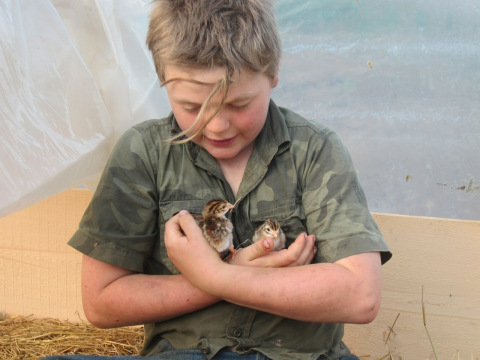
Over the years, the boys have become essential to the slaughter and processing of animals on our land. For the last two batches of pigs, they have been the ones to pull the trigger, and they have assisted in the skinning, dressing, cutting, and wrapping. They enjoy the work, and I can foresee a day when they will inherit the whole darn process, and that would be just fine with me.
Either that, or they’ll start eating tofu.
Often, I think to myself what is wrong with death? And the only honest answer I can come up with is nothing. This does not make death easy, and it does not mean we don’t feel grief, particularly when death comes to humans. This does not mean that if the threat of death came to someone I love, I would not do everything in my power to fight it off. But that grief and that willingness to fight do not make death wrong. They do not deny the essential role of dying in the constant, cycling process of nature.
They do not mean, no matter how much our human ingenuity and ever-increasing distance from the natural world makes it seem so, that we can stand apart from death. It is just as real and present as every breath we take.

May 30, 2013
I Admit It
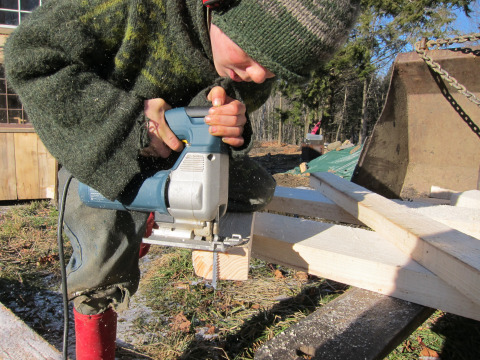
At work
I am not actually all that busy. True, there is plenty to be done, but no more than the day can accommodate, and what doesn’t get done today, will get done tomorrow. Or next month, whichever comes first.
I do not get very many emails. I do not have hundreds of unanswered emails begging for the attention I could give them if only I were not so busy. Because, remember: I’m not actually all that busy. And I don’t actually get very many emails.
I do not wish there were more hours in the day. I am perfectly content with 24.
I do not feel pulled in too many directions. I know exactly how I’m going to get everything done: One slow step at a time.
My phone is not ringing off the hook, and I do not worry about how I’d live without my cell phone. I do have a cell phone, but I do not know where it is, and I could not tell you the number if you asked.
This might explain why my phone is not ringing off the hook.

May 29, 2013
Cows at Night. And at Morning
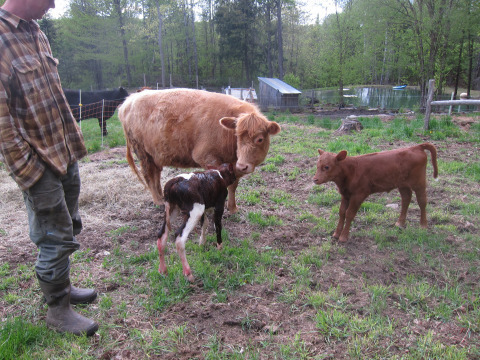
Introducing Apple’s calf Foster to his foster mother, in hopes she will allow him to nurse.
Which she did.
This morning I was out early, preparing a fresh paddock for the cows’ daily grazing pleasure. It’s hero pasture now, a sea of cow candy everywhere you look, thick, verdant, top-of-shin high. It’s hard to remember that it won’t last forever, that in just a few months we’ll be scheming on how to squeeze a couple extra weeks out of the grass to cut down on the hay bill. But damn this is exactly what I love about this place: The seasonality of everything and the obscure rural ingenuity it demands.
So anyway. There I was, and it was that sort of milky, half-light of pre-dawn, and I was standing by the fence line admiring our motley herd, all of them sleek and glossy and filled-out, not a rib to be seen. And just at that moment, just as I was about to drop the wire that stood between them and that enviable, concentrated contentment that is unique to grazing bovine, it softly – very softly – began to rain. And I thought of this poem by Hayden Carruth, which is approximately my favorite poem ever (which given the volume of poetry I’ve exposed myself, is not saying terribly much). By the way, my second, third, fourth, and fifth favorite poems were all written by this guy.
Here you go. Enjoy.
The Cows At Night
The moon was like a full cup tonight,
too heavy, and sank in the mist
soon after dark, leaving for light
faint stars and the silver leaves
of milkweed beside the road,
gleaming before my car.
Yet I like driving at night
in summer and in Vermont:
the brown road through the mist
of mountain-dark, among farms
so quiet, and the roadside willows
opening out where I saw
the cows. Always a shock
to remember them there, those
great breathings close in the dark.
I stopped, and took my flashlight
to the pasture fence. They turned
to me where they lay, sad
and beautiful faces in the dark,
and I counted them–forty
near and far in the pasture,
turning to me, sad and beautiful
like girls very long ago
who were innocent, and sad
because they were innocent,
and beautiful because they were
sad. I switched off my light.
But I did not want to go,
not yet, nor knew what to do
if I should stay, for how
in that great darkness could I explain
anything, anything at all.
I stood by the fence. And then
very gently it began to rain.

Ben Hewitt's Blog
- Ben Hewitt's profile
- 37 followers






